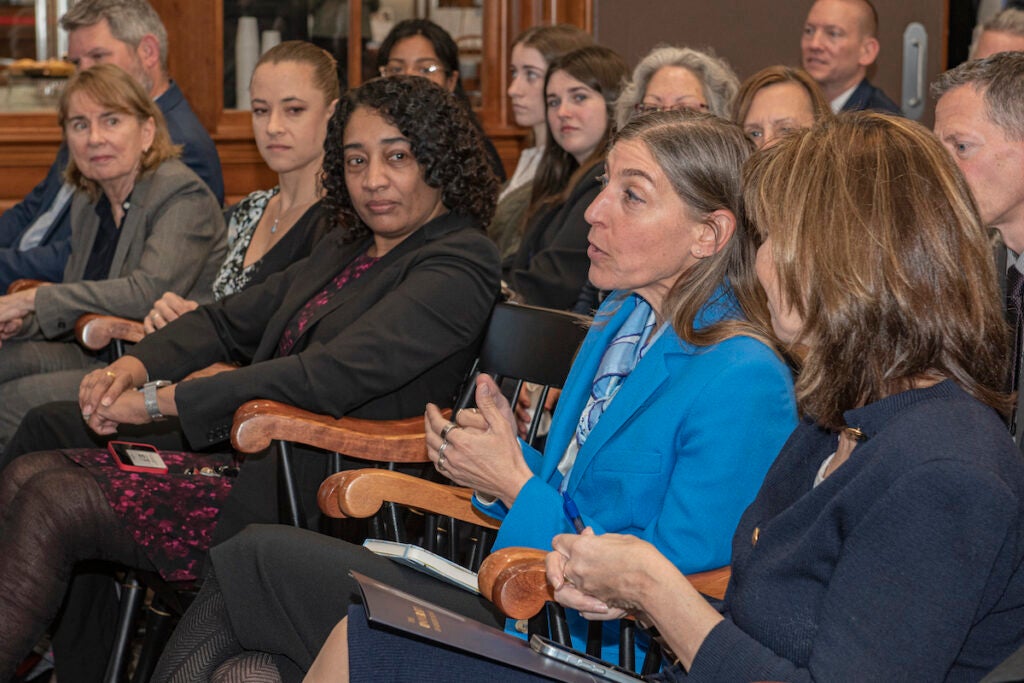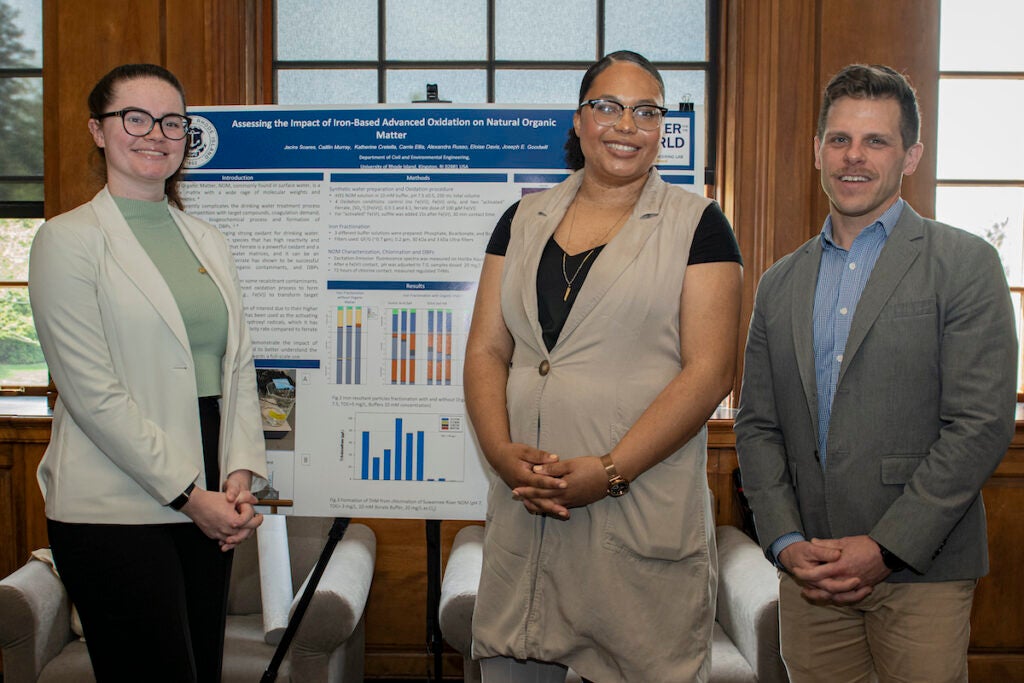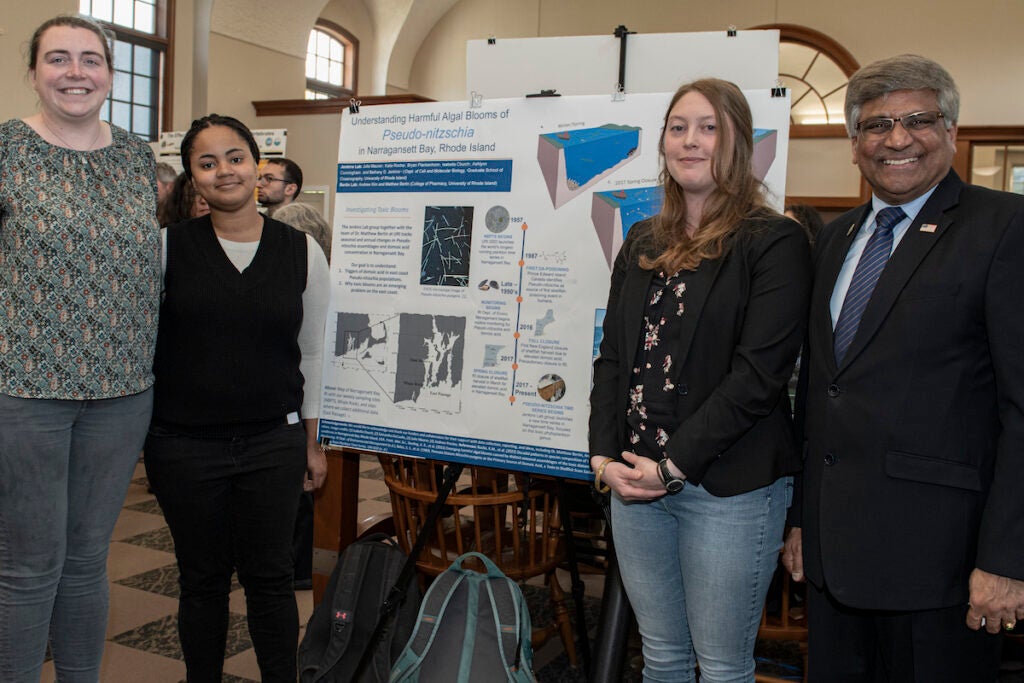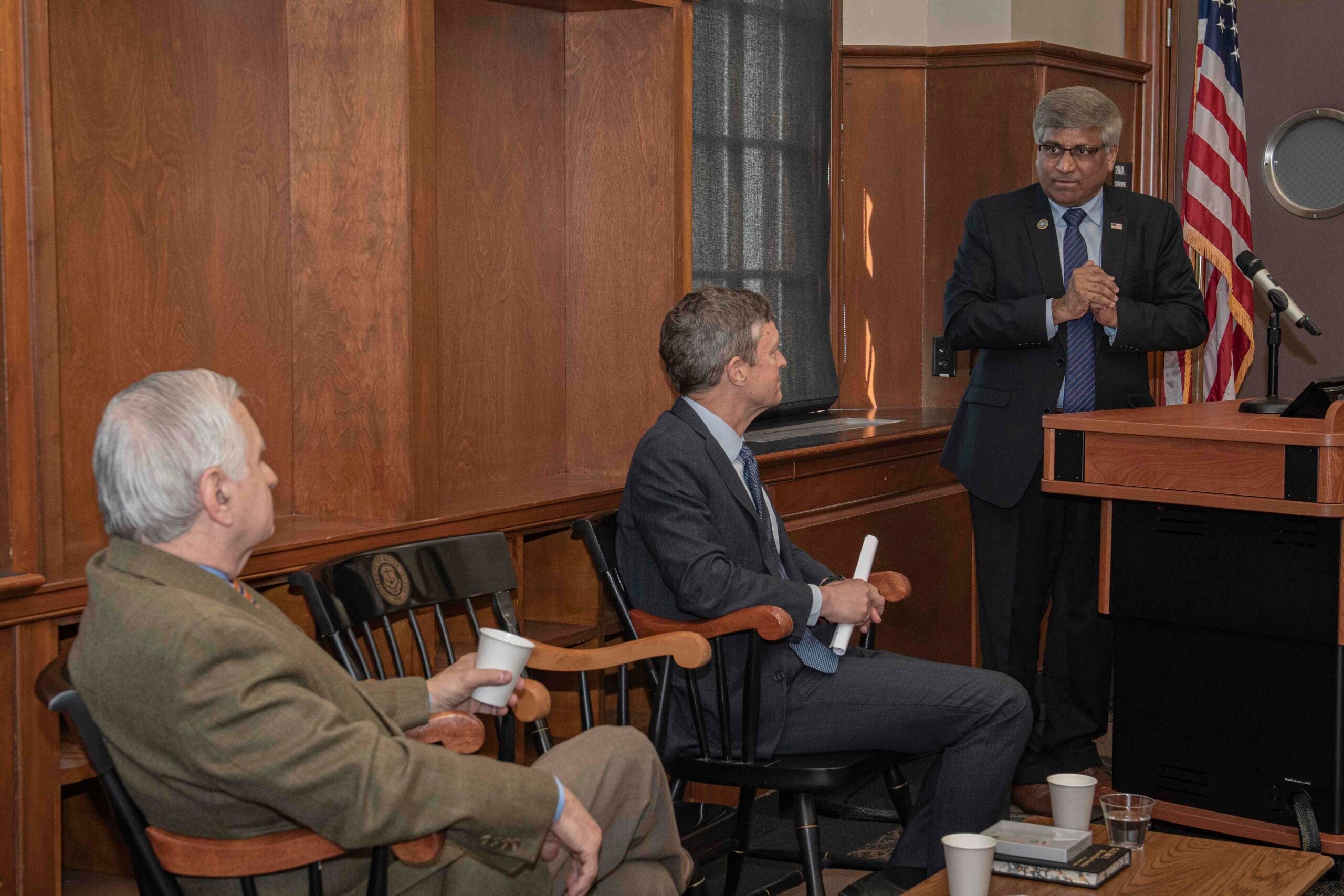KINGSTON, R.I —May 2, 2023—The director of the U.S. National Science Foundation, Sethuraman Panchanathan, received an up-close view of the impactful work happening at the University of Rhode Island and the significant upgrades being made to URI’s Narragansett Bay Campus on Friday. The visit by the head of the government agency that funds nearly a quarter of all federally supported basic research conducted at U.S. universities was part of a daylong series of meetings at URI hosted by U.S. Sen. Jack Reed and URI President Marc B. Parlange.
“We are so pleased to host Director Panchanathan and Senator Reed here at the University of Rhode Island. Thanks to their leadership and support our students and faculty are engaged in meaningful research that is addressing real-world challenges and transforming lives,” said Parlange. “We are highlighting some of that research here today and I look forward to continuing our important work together toward developing a more diverse and equitable STEM workforce for the future.”
As head of the NSF, Panchanathan—a trained computer scientist and engineer by trade—oversees a federal agency with an annual budget of $8.9 billion that supports basic research conducted by U.S. colleges and universities in a variety of fields such as mathematics, computer science, renewable energy, and the social sciences.

“Federally funded research has been at the heart of the United States’ economic success. And we want to use those resources to foster the talent and ideas we have in our backyard,” said Reed, who as a senior member of the Senate Appropriations Committee worked to increase the NSF budget by 12%, to nearly $10 billion for fiscal year 2023. “The investment that the National Science Foundation makes in Rhode Island leverages resources, contributes to our economy and strengthens our scientific community’s ability to advance new areas of research. NSF research has led to many scientific breakthroughs and URI is producing some advanced research that ranks among the nation’s best.”
In addition to touring the Bay Campus and viewing URI’s new pier that will serve as the homeport for the $125 million NSF-funded research vessel Narragansett Dawn—one of only three new Regional Class Research Vessels in the nation—Panchanathan and Reed met with top researchers, scientists, and engineers from URI, as well as representatives from Brown University, Bryant University, Community College of Rhode Island, Providence College, Rhode Island College, Rhode Island School of Design, Roger Williams University, and Salve Regina University.

In FY22, the NSF awarded more than $45 million in federal funding to Rhode Island-based research projects. During remarks at an event on URI’s Kingston Campus, Panchanathan outlined his vision for the NSF to maintain global leadership, ensure accessibility and inclusivity, and advance the frontiers of research into the future. This includes investment in basic and translational research; empowering role models and inspiring talent at every level of leadership and from all socioeconomic backgrounds; and accelerating science and technology progress and investments through collaboration with public, private and nonprofit partners.
“Innovation can happen anywhere, and opportunities have to be everywhere. I have seen firsthand that talent and ideas are everywhere, but yet we have not taken full advantage of that,” said Panchanathan, who pledged to continue NSF’s commitment to and investment in Rhode Island and discussed the need to democratize talent and ideas to improve science and technology.
The director noted that lawmakers, despite not always agreeing, have expressed overwhelming support for continued investment in science, engineering and innovation, adding that the 2022 CHIPS and Science Act is just one example of this, an important investment and tool that will help propel and inspire innovation.

Following a question-and-answer session with students and academic leaders, Parlange led Panchanathan and Reed on a tour of several URI research facilities, including the Fascitelli Center for Advanced Engineering and the Center for Biotechnology and Life Sciences.
The NSF director also met with several faculty members and students who showcased their work across a range of disciplines, including Bethany Jenkins, professor of cell and molecular biology and oceanography and interim vice president for research and economic development. Jenkins began at the University in 2005 as part of a group of NSF ADVANCE Fellows, a program intended to increase representation of women in academic science and engineering. Jenkins remarked that the members of her cohort have all remained at URI and are now full professors continuing important NSF-supported research.
Jenkins’ lab, which includes graduate students Julie Mauren, Katie Roche, Bryan Plankenhorn and Isabella Church, and undergraduate Ashlynn Cunningham, presented research being conducted in cooperation with Professor of Pharmacy Matthew Bertin and graduate student Andrew Kim on harmful pseudo-nitzschia algal blooms in Narragansett Bay. More common on the West Coast, the blooms produce a harmful neurotoxin which can accumulate in shellfish and have—in the past decade—led to shell fishing closures in Narragansett Bay. The team is conducting a time series study of the blooms to better understand the conditions under which they occur.
Similarly, Ying Zhang, associate professor of cell and molecular biology, and her team of graduate and undergraduate researchers presented several examples of research using artificial intelligence and computational modeling to better understand organism adaptations to environmental changes and address bottlenecks in bioproduction. One project, conducted by graduate student Cecile Cres, involved the development of deep learning tools for application in biological sequencing. Graduate students Jason Vailinois and Ke Zhang, and post doc fellow Weishu Zhao, used computational modeling to inform engineering strategies for making biologically based chemical products such as ethanol. A third project, conducted by graduate student Christopher Powers and undergraduates Kaylee Harri and Leland Macey, involves the study of a unique single-celled organism that grows a carbonite shell and lives in the sediment along Narragansett Bay. The research involves taking sediment samples and looking at the microscopic organisms in the lab to determine how they grow and respond to environmental anomalies such as ocean acidification.
Several of the URI presenters were NSF CAREER award winners. The coveted Faculty Early Career Development Program (CAREER) award is the NSF’s most prestigious honor in support of early-career faculty who have the potential to serve as academic role models in research and education and to lead advances in the mission of their department or organization. URI has 10 faculty members with active CAREER awards, a testament to the high quality of talent across the University and the promising future for research in the Ocean State.
Students and faculty from URI, along with those from other Rhode Island universities, showcased their NSF-supported work during the director’s visit.

